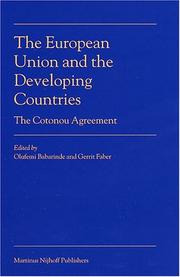| Listing 1 - 10 of 10 |
Sort by
|
Book
Abstract | Keywords | Export | Availability | Bookmark
 Loading...
Loading...Choose an application
- Reference Manager
- EndNote
- RefWorks (Direct export to RefWorks)
Agricultural assistance, European --- Agricultural development projects --- Agriculture --- Food industry and trade --- Finance --- Economic aspects --- Cotonou Agreement --- Developing countries --- European Union countries --- Foreign economic relations
Book
Year: 2018 Publisher: Frankfurt a.M. PH02
Abstract | Keywords | Export | Availability | Bookmark
 Loading...
Loading...Choose an application
- Reference Manager
- EndNote
- RefWorks (Direct export to RefWorks)
The objective of this study is to provide an account of the terminology the European Union has created and used with regard to its development cooperation policy since the Treaty of Rome was signed in 1957. For this purpose, a terminological analysis has been conducted, based on a corpus of texts produced by the EU in this domain. A corpus-based approach to terminology has been chosen as it opens up the possibility to gather both conceptual and linguistic as well as usage information about the terminological units. Moreover, it allows the study of terms in the context of communicative situations and enables the analysis of concordances that can be used to reveal possible ideological aspects of the terminology involved. The book not only provides a detailed and comprehensive report on the status quo of the EU's terminology in this field. It also reflects the evolution of its terminology since the establishment of a common European development cooperation policy and thus against the background of an ever-changing socio-economic and political situation. The findings are meant to contribute to a better knowledge and understanding of European development cooperation policy as well as to help improve communication between professionals in European and national bodies.
Lexicography --- African --- Aigner --- Analysis --- Based --- Caribbean --- Cooperation --- Corpus --- Cotonou Agreement --- Development --- electronic text corpora --- European --- Group --- Kast --- Lomé Conventions --- Pacific --- Policy --- States --- Terminology --- Treaty of Rome --- Union’s --- with --- Yaoundé Conventions
Book
Year: 2018 Publisher: Frankfurt a.M. PH02
Abstract | Keywords | Export | Availability | Bookmark
 Loading...
Loading...Choose an application
- Reference Manager
- EndNote
- RefWorks (Direct export to RefWorks)
The objective of this study is to provide an account of the terminology the European Union has created and used with regard to its development cooperation policy since the Treaty of Rome was signed in 1957. For this purpose, a terminological analysis has been conducted, based on a corpus of texts produced by the EU in this domain. A corpus-based approach to terminology has been chosen as it opens up the possibility to gather both conceptual and linguistic as well as usage information about the terminological units. Moreover, it allows the study of terms in the context of communicative situations and enables the analysis of concordances that can be used to reveal possible ideological aspects of the terminology involved. The book not only provides a detailed and comprehensive report on the status quo of the EU's terminology in this field. It also reflects the evolution of its terminology since the establishment of a common European development cooperation policy and thus against the background of an ever-changing socio-economic and political situation. The findings are meant to contribute to a better knowledge and understanding of European development cooperation policy as well as to help improve communication between professionals in European and national bodies.
African --- Aigner --- Analysis --- Based --- Caribbean --- Cooperation --- Corpus --- Cotonou Agreement --- Development --- electronic text corpora --- European --- Group --- Kast --- Lomé Conventions --- Pacific --- Policy --- States --- Terminology --- Treaty of Rome --- Union’s --- with --- Yaoundé Conventions
Book
Year: 2018 Publisher: Frankfurt a.M. PH02
Abstract | Keywords | Export | Availability | Bookmark
 Loading...
Loading...Choose an application
- Reference Manager
- EndNote
- RefWorks (Direct export to RefWorks)
The objective of this study is to provide an account of the terminology the European Union has created and used with regard to its development cooperation policy since the Treaty of Rome was signed in 1957. For this purpose, a terminological analysis has been conducted, based on a corpus of texts produced by the EU in this domain. A corpus-based approach to terminology has been chosen as it opens up the possibility to gather both conceptual and linguistic as well as usage information about the terminological units. Moreover, it allows the study of terms in the context of communicative situations and enables the analysis of concordances that can be used to reveal possible ideological aspects of the terminology involved. The book not only provides a detailed and comprehensive report on the status quo of the EU's terminology in this field. It also reflects the evolution of its terminology since the establishment of a common European development cooperation policy and thus against the background of an ever-changing socio-economic and political situation. The findings are meant to contribute to a better knowledge and understanding of European development cooperation policy as well as to help improve communication between professionals in European and national bodies.
Lexicography --- African --- Aigner --- Analysis --- Based --- Caribbean --- Cooperation --- Corpus --- Cotonou Agreement --- Development --- electronic text corpora --- European --- Group --- Kast --- Lomé Conventions --- Pacific --- Policy --- States --- Terminology --- Treaty of Rome --- Union’s --- with --- Yaoundé Conventions
Multi
ISBN: 3631552785 9783631552780 Year: 2006 Publisher: Frankfurt am Main : Lang,
Abstract | Keywords | Export | Availability | Bookmark
 Loading...
Loading...Choose an application
- Reference Manager
- EndNote
- RefWorks (Direct export to RefWorks)
Economic assistance, European --- Aide économique européenne --- World Trade Organization --- Rules and practice. --- Cotonou Agreement --- European Union countries --- Developing countries --- Pays de l'Union européenne --- Pays en développement --- Foreign economic relations --- Economic policy. --- Relations économiques extérieures --- Politique économique --- Aide économique européenne --- Pays de l'Union européenne --- Pays en développement --- Relations économiques extérieures --- Politique économique
Book
ISBN: 9786131507717 6131507716 Year: 2010 Publisher: Saarbrücken: Éditions universitaires européennes,
Abstract | Keywords | Export | Availability | Bookmark
 Loading...
Loading...Choose an application
- Reference Manager
- EndNote
- RefWorks (Direct export to RefWorks)
Communitarianism --- Regionalism --- Supranationalism --- International economic relations --- Communautarisme --- Régionalisme --- Supranationalité --- Relations économiques internationales --- Cotonou Agreement --- European Union countries --- Africa, Central --- Pays de l'Union européenne --- Afrique centrale --- Foreign relations --- Relations extérieures --- Economic assistance, European --- aAfrica, Central --- Africa, Southern --- Economic conditions --- Politics and government --- Economic integration --- Social conditions --- Foreign economic relations --- Régionalisme --- Supranationalité --- Relations économiques internationales --- Pays de l'Union européenne --- Relations extérieures --- Economic assistance, European - Africa, Central --- Economic assistance, European - Developing countries --- Africa, Central - Economic conditions --- Africa, Central - Politics and government --- Africa, Central - Economic integration --- aAfrica, Central - Social conditions --- European Union countries - Foreign economic relations - Africa, Southern --- Africa, Southern - Foreign economic relations - European Union countries

ISBN: 9780230516786 0230516785 1349354589 9786611975951 1281975958 0230582710 9781281975959 9780230582712 Year: 2008 Publisher: London : Palgrave Macmillan UK : Imprint: Palgrave Macmillan,
Abstract | Keywords | Export | Availability | Bookmark
 Loading...
Loading...Choose an application
- Reference Manager
- EndNote
- RefWorks (Direct export to RefWorks)
In 2000 the European Union and its 78 African-Caribbean-Pacific partners signed the Cotonou Agreement, heralding a new era in developmental politics. This comprehensive book draws attention to the limitations in the EU's approach to implementing pro-poor, environmentally sustainable development amongst its African-Caribbean-Pacific partners.
Cotonou Agreement --- European Union countries --- Africa --- Caribbean Area --- Pacific Area --- Pays de l'Union européenne --- Afrique --- Caraïbes (Région) --- Pacifique, Région du --- Foreign economic relations --- Relations économiques extérieures --- Pays de l'Union européenne --- Caraïbes (Région) --- Pacifique, Région du --- Relations économiques extérieures --- Poverty. --- Social justice. --- Human rights. --- European Union. --- Environmental geography. --- Economic policy. --- Environmental sociology. --- Development Aid. --- Social Justice, Equality and Human Rights. --- European Union Politics. --- Environmental Geography. --- Development Policy. --- Environmental Sociology. --- Economic development. --- Europe --- Physical geography. --- Environmental sciences --- Development Studies. --- Human Rights. --- European Politics. --- Physical Geography. --- Environmental Social Sciences. --- Politics and government. --- Social aspects.

ISBN: 0850927897 9780850927894 Year: 2004 Publisher: London: Commonwealth secretariat,
Abstract | Keywords | Export | Availability | Bookmark
 Loading...
Loading...Choose an application
- Reference Manager
- EndNote
- RefWorks (Direct export to RefWorks)
International economic relations. --- Relations économiques internationales --- Cotonou Agreement --- Developing countries --- European Union countries --- Pays en développement --- Pays de l'Union européenne --- Foreign economic relations --- Relations économiques extérieures --- Economic assistance, European --- Sustainable development --- Economic policy --- Relations économiques internationales --- Pays en développement --- Pays de l'Union européenne --- Relations économiques extérieures --- Economic assistance, European - Developing countries --- Sustainable development - Developing countries --- European Union countries - Foreign economic relations - Developing countries --- Developing countries - Foreign economic relations - European Union countries --- European Union countries - Economic policy --- Developing countries - Economic policy

ISBN: 9789001441999 9004141995 9786610867448 1429452579 9047406788 1280867442 1433707217 9781429452571 9789004141995 9781280867446 6610867445 9789047406785 9781433707216 9001441998 Year: 2005 Publisher: Leiden Boston Martinus Nijhoff Publishers
Abstract | Keywords | Export | Availability | Bookmark
 Loading...
Loading...Choose an application
- Reference Manager
- EndNote
- RefWorks (Direct export to RefWorks)
The relationships between the European Union and developing countries in Africa, the Caribbean and the Pacific (or ACP countries) have been called a model for North South development cooperation. The Lomé Conventions were the embodiment of this model. After 25 years, the European Union and the ACP group signed a new partnership agreement, the Cotonou Agreement. Given the disappointing results of the former conventions, this book investigates the innovations in the EU-ACP relationship. Authors from different backgrounds (including law, political science and economics) analyze the forces that gave rise to the new agreement as well as the negotiating process of the new agreement, and the negotiations that are taking place to produce the planned Economic Partnership Agreements (EPA) that are to replace the existing non-reciprocal trade preferences that are incompatible with WTO law. The potential benefits of EPAs are discussed, as is the alternative in the shape of an improved and general preferential system. The amended mechanism for aid delivery, the increased stress on political dialogue between the partners and the introduction of more civil society participation in the cooperation are extensively analyzed and discussed. The effects of the introduction of the Euro and the effect of the planned stimuli on Direct Foreign Investment in ACP economies make this volume very complete in coverage of the ACP-EU relations. Its relevance extends far beyond the ACP-EU relationship as it shows and discusses particular solutions for problems that occur in North South relations in general.
ACP-EU Cotonou Partnership Agreement --- European Union countries --- Developing countries --- Pays de l'Union européenne --- Pays en développement --- Foreign economic relations --- Relations --- Relations économiques extérieures --- European Union countries - Foreign economic relations - Developing countries. --- Economic History --- Business & Economics --- Economic policy. --- Pays de l'Union européenne --- Pays en développement --- Relations économiques extérieures --- Emerging nations --- Fourth World --- Global South --- LDC's --- Least developed countries --- Less developed countries --- Newly industrialized countries --- Newly industrializing countries --- NICs (Newly industrialized countries) --- Third World --- Underdeveloped areas --- Underdeveloped countries --- Economic policy --- International economic relations --- Economic policy, Foreign --- Economic relations, Foreign --- Economics, International --- Foreign economic policy --- Interdependence of nations --- International economic policy --- International economics --- New international economic order --- International relations --- Economic sanctions --- Economic nationalism --- Economic planning --- National planning --- State planning --- Economics --- Planning --- National security --- Social policy --- International economic relations. --- Cotonou Agreement --- Accord ACP-EU de Cotonou --- Accord de Cotonou --- ACP-EC Partnership Agreement --- ACP-EU Partnership Agreement --- Cotonou Partnership Agreement --- Cotonou (Treaty) --- CPA (Treaty) --- New ACP-EU (Cotonou) Agreement --- Nouvel accord de partenariat ACP-UE (Cotonou) --- Partnership Agreement between the African, Caribbean and Pacific Group of States (ACP), of the One Part, and the European Community and Its Member States, of the Other Part --- Partnership Agreement between the Members of the African, Caribbean and Pacific Group of States of the One Part, and the European Community and Its Member States, of the Other Part
Book
ISBN: 9782802723790 2802723790 Year: 2007 Volume: 7 Publisher: Bruxelles : Bruylant,
Abstract | Keywords | Export | Availability | Bookmark
 Loading...
Loading...Choose an application
- Reference Manager
- EndNote
- RefWorks (Direct export to RefWorks)
ACP Group --- European Union countries --- Groupe des Etats d'Afrique, des Caraïbes et du Pacifique --- Pays de l'Union européenne --- Commercial treaties --- Foreign economic relations --- Accords commerciaux --- Relations économiques extérieures --- International economic relations --- ACP-Group --- Lomé Convention --- Cotonou Agreement --- Developing countries --- BPB0804 --- 330.34 --- 339.96 --- Economische ontwikkeling. Regionale economische ontwikkeling --- Ontwikkelingshulp. Ontwikkelingssamenwerking. Ontwikkelingsproblematiek --- International economic relations. --- ACP-Group. --- 339.96 Ontwikkelingshulp. Ontwikkelingssamenwerking. Ontwikkelingsproblematiek --- 330.34 Economische ontwikkeling. Regionale economische ontwikkeling --- Groupe des Etats d'Afrique, des Caraïbes et du Pacifique --- Pays de l'Union européenne --- Relations économiques extérieures --- Economic policy, Foreign --- Economic relations, Foreign --- Economics, International --- Foreign economic policy --- Interdependence of nations --- International economic policy --- International economics --- New international economic order --- Economic policy --- International relations --- Economic sanctions --- ACP --- ACP States --- African, Caribbean, and Pacific Group of States --- AKP-Gruppe --- Group of the African, Caribbean, and Pacific States --- Groupe ACP --- Groupe des états d'Afrique, des Caraïbes et du Pacifique --- Lomé Convention --- ACP-EEC Convention --- Emerging nations --- Fourth World --- Global South --- LDC's --- Least developed countries --- Less developed countries --- Newly industrialized countries --- Newly industrializing countries --- NICs (Newly industrialized countries) --- Third World --- Underdeveloped areas --- Underdeveloped countries --- European Union countries - Foreign economic relations - Developing countries --- Developing countries - Foreign economic relations - European Union countries --- UNION EUROPEENNE --- Accord de Cotonou --- RELATIONS EXTERIEURES --- PAYS D'AFRIQUE, DES CARAIBES ET DU PACIFIQUE (ACP)
| Listing 1 - 10 of 10 |
Sort by
|

 Search
Search Feedback
Feedback About UniCat
About UniCat  Help
Help News
News